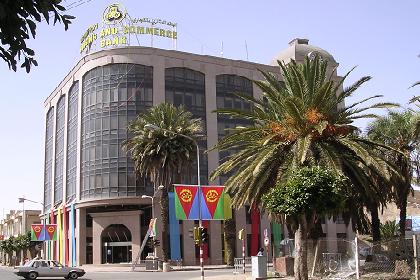Eritrea faces serious economic problems, possibly indicating sustainable decline
2016-07-20 19:58:09 Written by EEPA News Published in English Articles Read 3765 timesPublished on Tuesday, 19 July 2016 16:32
 Despite growing foreign investments in Eritrea's industrial sector, decreasing remittances, slavery-like working conditions, a huge brain drain, and a misguided currency reform endanger wealth production and allocation in the state formerly seeking economic self-reliance.
Despite growing foreign investments in Eritrea's industrial sector, decreasing remittances, slavery-like working conditions, a huge brain drain, and a misguided currency reform endanger wealth production and allocation in the state formerly seeking economic self-reliance.
Mary Harper, Africa editor of the BBC, argues that recent economic policies of the Eritrean government have an already poor population now getting into serious difficulty in working for their living. She identifies several reasons for this which are investigated in this article with further evidence.
First, national service forces female as well as male Eritreans to indefinite service on low pay, despite recent increases. Eritrea's national service has been criticised by a UN Commission of Inquiry and independent NGOs, for its arbitrary duration that can last for decades and often features mental, physical and sexual abuse by supervisors and slavery-like work. Some 5 000 people are said to flee Eritrea every month, most of whom name national service as the main reason.
Secondly, the cost of living for many people in Eritrea exceeds their usual incomes, forcing them to work in two or even three jobs, even if when they are still obliged to do their duties for national service. Housing and living costs in Eritrea, especially in the capital Asmara, were already unaffordable without additional jobs in 2010, if one was a national service conscript receiving less than $50/month. Even with a possible increase to $300/month as Hagos Ghebrehiwet, the economic advisor to the Eritrean President, announced to Harper, it is not plausible that conscripts could afford to cover their living costs only from national service income. The result is that thousands flee the country every month draining the country of productive workers. Although a third of Eritrea's GDP has been derived from remittances of Eritreans living abroad, this now appears to be shrinking as increased preference is given to help friends and relatives leave the country.
Thirdly, the recent currency reform allegedly aimed at hitting smugglers, limits access to finance which is severely harming business people, shopkeepers and hoteliers. The currency reform of November 2015 restricts the withdrawals that Eritreans are allowed to take from their bank accounts to 20,000 Nakfa and consequently the amount of money they can invest, e.g. in their businesses. Officially 15 Nakfa equal $1, but effectively it takes 50 to 58 Nakfa to change $1 on the black markets, so the restriction of withdrawal will severely affect the purchase power of Eritrean people.
Lastly, Harper says that the adjustment of the economy to receive foreign investments in the mining sector might increase Eritrea's GDP but without actually improving job supply. While it is true that during the last years, foreign investment in the mining sector has contributed to an increase of Eritrea's industry and so to its GDP, Harper correctly argues that the resulting gains only affect a small minority of the Eritrean people. Around 80% of Eritreans work in the agricultural sector but only contribute with 12.3% to the GDP. The growing industrial share of GDP has not resulted in industrial job growth. Furthermore, the budget deficit is understood to remain enormous although this can only be estimated as the government has never published a comprehensable budget overview.
All in all, there is strong evidence for Harper's claim that Eritrea's economic model has run out of steam at the expenses of the majority of the population. Yet, there are no signs that the Eritrean government recognises this potentially disastrous development. Even with the EU's development cooperation package, there are few reasons to believe that the root causes of mass flight from the country are properly addressed.




















